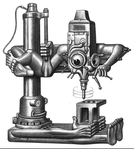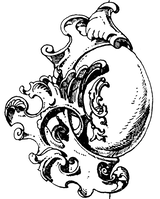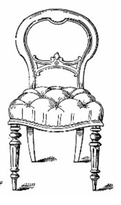 Jacquie and Rich are a fabulous singer-songwriter duo called Small Potatoes. They’ve been a big part of the household soundtrack these days, so darned if they didn’t inspire this post. Potato entered English in the 1560s form the Spanish patata. The Spanish borrowed the word from the people of Haiti, who called their native sweet potato batata. The paler tuber brought to Europe in 1565 from Peru is the tuber most first-world folks think of today as the potato: the potato of Idaho, of Ireland, of infamous emigration-inspiring famines, though it wasn’t called a potato until 1590. Oddly, this interloper was referred to both as the Virginia potato (geographic confusion, you say?), or the bastard potato (at the time it had to play second fiddle to the sweet potato). The word tuber came to English in the 1660s from a Latin word meaning thick underground stem. It’s Proto-Indo-European root tubh-, which meant to swell, also gave us the word thigh. My preferred term for potatoes is spuds, a word first applied to our friend the potato in New Zealand about 1845. Though nobody’s sure, spud appears to have come to English from Danish or Old Norse, where it meant spear, lance, & spade. That third meaning might certainly lead to spud’s modern meaning, though at some point in the 1680s English speakers also began using the word spud to refer to a short stumpy person or thing. Hmmm. Have a minute? Check out Rich & Jacquie singing a ridiculous Who’s-On-First type song all about a traveling salesman meeting the Knott family: Shirley, Mae Bea & Wy. Have another minute? Please leave a comment about all these potato-related etymologies, or about the musical group, Small Potatoes. . Big thanks to this week’s sources: Wordnik, Etymonline, Merriam Webster, the OED.
8 Comments
 Welcome to the final installment on words that refer to our belongings. You can find the first three posts here, here, & here. The word accoutrements (which can sadly also be spelled accouterments) and means clothing, equipment or apparatus, arrived in English in the 1540s from Middle French. It came through Old French from the Vulgar Latin word, accosturare, to sew up. Though accosturare looks as though it may also be the root for costume, it is not, but it did give us the word suture. The word possession arrived in English in the 1300s through Old French from Latin. Through all three languages possession has meant item one owns, however, in English the meaning demonic possession was added in the 1580s, just in time for the zealotry that led up to the Salem witch trials a century later. An earlier Wordmonger “stuff” post compelled Julie Harris, to ask, “Can I use the word ‘things’ instead?” Absolutely. The word things came to Modern English from Old English. The singular form, thing, looked like þing & originally meant a meeting, assembly or discussion. Because meetings involved discussions of items, thing picked up the meaning entity, item, being or matter. Though that original meaning of meeting, assembly or discussion has been lost in English, we can still see evidence of it in Iceland, where the nation’s general assembly is called the Althing. And that very 1960s phrase do your thing actually made its way into the language in the 1840s. The word paraphernalia came to English in the 1650s from Medieval Latin, originally meaning a woman’s property other than her dowry. The Medieval Latin word’s source is Greek, where it held that same meaning and was constructed of the word parts pherein, to carry, and para, beside. The modern meaning, personal belongings or articles used in a particular activity showed up in 1791. Good readers, please leave any thoughts regarding all these things in the comments section. Big thanks to this week’s sources: Wordnik, Etymonline, Merriam Webster, the OED.  In this pre-election season, why not take a look at words that may (or may not) apply to political speech? Harangue, now meaning a pompous speech or tirade, came to English in the 1400s through Scottish from Middle French. The Middle French word, harangue, meant a public address, which came from the Old Italian word aringo, a public square or pulpit. Aringo came from the Old High German word hring, which simply meant circle. This probably referred to people gathering in a circle to hear someone talk or its source may be the Old High German word harihring, or army-ring. In either case, it seems harangue’s origin has more to do with the audience’s configuration than the speaker’s vitriol. Interestingly, this same root gave us ring, rank, range & arrange. In the 1640s the word diatribe came to English from Latin through French. The Latin word meant learned discussion, & the Greek source of the Latin word meant employment or study. This Greek word was constructed of dia- meaning away, & tribien, meaning to wear or rub. So, even back at its very source, a diatribe was simply a wearing away, or loss of the listener’s time. In the 1300s the word oration appeared in English meaning speech or prayer. It comes from the Latin word orare, meaning to pray, plead, or speak before an assembly. It wasn’t until the 1500s that oration collected its modern meaning, a formal speech The word lecture showed up in the 1300s meaning that which is read. It comes from the Medeival Latin word lectura, a reading. Going back further, lectura comes from a verb meaning to collect or gather, a word whose literal translation was firewood. Could this root account for the fact that many lectures are perceived as nothing more than blowing smoke? Good readers, please leave any thoughts about lectures, diatribes, harangues or orations in the comments section. Big thanks to this week’s sources: Wordnik, Etymonline, Merriam Webster, & the OED.  I’m having too much fun with words meaning stuff. First one post, then a second, & now a third post all looking into words we use for our belongings. In 1942 the US Navy & Marines gave us the word gizmo, meaning any old thing you can’t put a name to. Nobody can verify why that particular collection of letters adopted that meaning, but such is life. In 1824 the word thingamajig came to English, meaning an item one can’t recall the name of. It’s brethren thingy, thingumabob, thingum & thingummy all provide the same function though their dates of origin are tougher to corroborate. Another synonym for something one can’t recall the name of is whatchamacallit, which appeared in that form in 1928, derived from what you may call it. Interestingly, the earliest word of that nature appears to be what-call-ye-hym, the precursor to our modern whatshisname. A beautifully honest word that entered English in the 1600s meaning equipment that hinders or encumbers, is the word impedimenta. It’s the plural form of the Latin word for luggage that gets in the way, impedimentum. Ah, says the minimalist, how I would love to have the talent to identify the impedimenta in my life. The word trappings, meaning personal effects, arrived in English in the 1400s from its 1300s form, trappe, meaning saddle blanket or ornamental cloth for a horse, which in turn came from the French word drap, a word related to the English word drape. Ah, repeats the aforesaid minimalist, for the times when all our trappings could be draped over the back of a horse (though then one would have to care for the horse, a task that sounds most unpleasant to this minimalist). So readers, what is worthy of comment in all this stuff-talk? Big thanks to this week’s sources: Wordnik, Etymonline, Merriam Webster, the OED.  I’m on a roll with words referring to unessential belongings. So here’s the second post in the series. My great grandmother referred to knick-knacks as gewgaws. Though in my youth I imagined she had created this word, gewgaw came to English in the early 1200s, centuries before my great grandmother existed. Though etymologists aren’t sure of its source, some have suggested gewgaw is an intentionally mispronounced version of the Old French word gogue, which meant rejoicing, prank, or mockery. Others have suggested it came from the French word for play, jouer. These days it means a gaudy but valueless trinket. Another word meaning the same thing is bauble, which came to English in the 1300s from the French word baubel, a child’s trinket or toy. Again, no source has been verified, but etymologists have suggested it may be a reduplication of the French or Latin word for pretty, belle or bel. The word trinket also comes from no known source. It showed up in English in the 1530s & may have come from the word trick. An American English word meaning unnamed thing, gadget or device is dingus, but this one has a clear source. It came to English in 1876 from the Dutch word for thing, dinges. Also appearing in American English in 1905 & 1914 respectively, we have doodad & doohickey. Etymologists label one a “made up word” & the other an “arbitrary formation”, which suggests that nobody knows a darn thing about the source of either word. Both doodad & doohickey mean an unnamed thing, gadget or device. Good readers, please leave anything you have to say about all these trinket-esque words in the comments section. Big thanks to this week’s sources: Wordnik, Etymonline, Merriam Webster, the OED.  Due to generations of countless variables, I am a member of a group identified as suburban Americans. Most members of our loosely defined group occasionally look around ourselves & realize we are surrounded by more belongings than we need. The next couple of posts are dedicated to words we use to define our stuff. The Old French word estoffe referred to quilted material, furniture or provisions. It made its way into English as stuff in the 1300s, meaning quilted material worn under chain mail. In the 1400s stuff also began to mean material for working with in various trades. This meaning broadened by the 1500s to the modern meaning, matter of an unspecified nature. Also in the 1500s, the closely related word stuffing gained two meanings: material for filling cushions, & seasoned mixture used to stuff fowls before cooking. The literal sense of the Old French word junc referred to rushes or reeds, while the figurative sense meant of little value. English sailors of the 1300s re-spelled the word junke & used it to label both old cable or rope, & worthless stuff. The word maintained its nautical connection in the 1800s & referred to old refuse from boats & ships, which soon broadened to mean old, discarded items of any kind. The term junk mail was born in 1954, junk art showed up in 1966, & 1971 brought us the term junk food. The word junkie, meaning drug addict, came to us in 1923. The Chinese sailing ship type of junk comes from an entirely different root, the Malay word jong (Iarge ship), which made its way to English through Portuguese. Claptrap is a theater term from the 1730s. Made up of clap & trap, it initially defined any gimmick or trick inserted for the sole purpose of catching applause. By 1819 claptrap morphed into meaning cheap or showy language, which led to its modern meanings, either pretentious, insincere language, or rubbish or unnecessary belongings. In the 1570s the word knick-knack was born, a reduplication of the word knack, which came to English in the 1300s meaning a deception, trick or device. By the 1700s, knick-knack picked up the meaning toy, and from there it morphed into our modern meaning, a cheap ornament or unnecessary decorative item. I find it intriguingly honest that the words knick-knack & claptrap both began as some sort of deception, but now refer to the unnecessary things with which we surround ourselves. How many of us deceive ourselves into believing we need these things? We derived the word tchotchke (or chachkie) from a Yiddish word meaning trinket. It came to English in 1964. As much as I enjoy The Urban Dictionary, I typically don’t cite crowdsourced sources. In this case, though, the Urban Dictionary’s definition of tchotchke is too good to pass up: “…just look around your house or someone else's and whatever you see that a burgler (sic) wouldn't steal is probably Tchotchke.” Good readers, I’m hoping some etymological tchotchke above inspires you to make a comment. Big thanks to this week’s sources: Wordnik, Etymonline, Merriam Webster, The Urban Dictionary, & the OED. |
I write for teens & tweens, bake bread, play music, and ponder the wonder of words in a foggy little town on California's central coast.
To receive weekly reminders of new Wordmonger posts, click on "Contact" & send me your email address. Archives
November 2023
|


 RSS Feed
RSS Feed